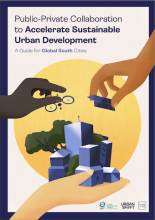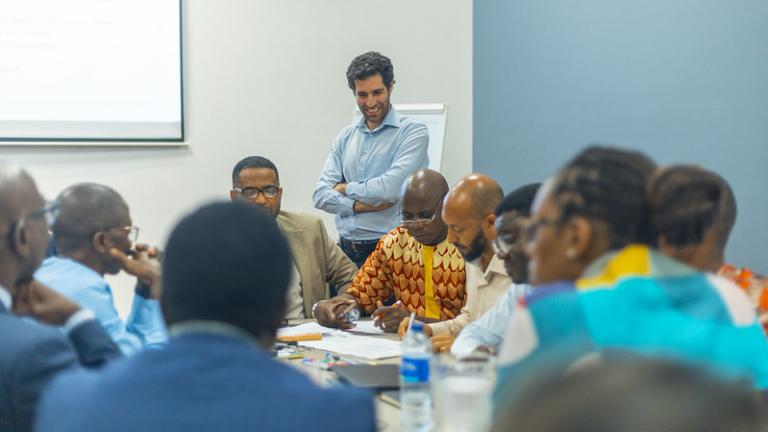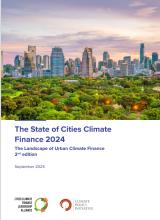Opinion
Lessons from the Global South's public-private climate collaborations
Spanning 30 cities in the Global South, UrbanShift's new guide to public-private collaboration highlights partnership models and best practices.
Calin Stan/Unsplash
By Marcela Guerrero Casas and Dustin Kramer of Local South, and Emily White of C40 Cities.
As dense hubs of diverse talent, skills and innovation, cities are perfect places for public-private collaboration. In light of the urgent calls from the international community for solutions, the wealth of creativity and expertise on urban sustainability in cities of the Global South can and must be supported. Urban solutions are already being implemented and can inspire action in cities with similar contexts.
However, while examples of public-private collaboration are well documented in the Global North, this is not often the case in the Global South. Information is often difficult to access because practices are not documented or fail to receive acknowledgment.
In speaking to city officials, private sector and academics in 30 cities to develop the UrbanShift guide on public-private collaboration for cities in the Global South, we learnt about various collaborations taking place across diverse sectors and players. With the proper support and resources, there is great potential for these to be further unlocked.
No collaboration is too small
One of the distinctive features of collaborations happening across Africa, Asia and Latin America is that they exist across a wide spectrum, from very large capital projects to smaller experiments and partnerships. In fact, sometimes it is in the smaller examples that the greatest potential for replicability lies.
The Bangladeshi capital Dhaka, for instance, set up a scheme with a local telecommunications company that made it mandatory for the company to provide public services in exchange for using public space to set up communications towers. This essential company infrastructure provides WiFi and lighting for all local residents and will soon host a network of air quality sensors.
Kigali also shows how leveraging public assets can create private and public benefits. After building the largest car-free zone in Rwanda's capital, the municipality was faced with the challenge of limited use of the space. They decided to bring in an events management company and instead, of receiving an upfront payment, it activated the space through events and used the profits it created to maintain the car-free zone.
There are various models of collaboration
Governments and businesses are not monolithic. Just as there are diverse departments within a city administration, businesses of different types and sizes are driven by a variety of incentives which, at times, align with the public good.
The more well known model through which cities and businesses work - Public-Private Partnerships (PPPs) - is actually just one of many being used. Cities in the Global South are engaging the private sector through other forms of collaboration, including policy-making, non-commercial convening or networks, enabling innovation through incubation or training, for example, and even leveraging international funding to foster public-private collaboration at the local level.
In some instances, this requires focusing on very specific interventions that are aligned with the private actor’s focus, as in the case of Bangkok, where the city worked with a mixed-ownership company called PPP Plastic on a waste management pilot.
It can, however, also mean creating broad platforms that welcome a diversity of voices. Take for instance the Buenos Aires Circular Economy Network, led by two city departments: Urban Hygiene and Public Space and Local Economic Development. They convene large local companies, as well as universities, professional bodies and non-profit organizations. The network became so popular that membership had to be halted, but the city is now designing a circular economy policy based on the intelligence gathered by the network.
Cities can shape local markets to be more sustainable through collaboration
Achieving such collaborations requires focusing on concrete actions and outputs, showing value to all stakeholders, making the best use of financial and non-financial resources and demonstrating long-term commitment. Those tactics may sound simple, but they require fully invested individuals to see them through. In doing so, cities have significant potential to influence the sustainability of the urban economy.

Lagos illustrates how creating a Climate Action Plan for its city can be done without following models from European or North American cities. Indeed, it designed its own strategy to engage companies in the energy, waste and water sectors. What came to be known as 'Climate Change Business Meetings' not only helped to strengthen relationships, they signalled to the private sector where the city is prioritizing investment so it can prepare accordingly.
And Rio de Janeiro developed a local incubation programme that has enabled almost a dozen small sustainability-focused startups to grow while benefiting the city directly. The startups are chosen through a bi-annual competition and the winner receives access to all data from the City’s Operations Centre for two years.
Maximizing collaboration to face the climate crisis
This is just the beginning. More can be done, not just to document existing practices, but to exchange ideas and replicate these public-private collaboration models in other parts of the world.
It is imperative to facilitate conversations, learning and information across these geographic contexts. Cities that are similar in size, budget and socio-economic contexts are more likely to be able to adapt and adopt similar solutions. City leaders, businesses and other stakeholders can see what’s possible, compare notes and share inspiring ideas.
We need not wait for the perfect conditions to be available. Imperfect, but real, solutions are already being proven and tested in cities with less than perfect opportunities and conditions. In facing the climate crisis, these may be the most important yet.
Exploring Sustainability in Shenzhen: An Exchange on City-Business Cooperation
Shenzen is a leader in nature-positive, low-carbon development. This UrbanShift Peer-to-Peer Exchange highlighted ideas for how cities across Asia can learn from their innovation.

UrbanShift Looks Back: Reflecting on Uniting Stakeholders for Climate Action
C40’s Viola Follini, Matheus Ortega, Emily White, Anelise Rosa, and Amaia Leonet discuss the value of bringing a wide range of sectors—from mayors to the private sector—to the table to accelerate urban transformation.

The State of Cities Climate Finance 2024
The 2024 State of Cities Climate Finance report (SCCFR) provides the most comprehensive assessment of urban climate flows and needs globally. It aims to inform action on mobilizing finance for city-level climate action at scale by 2030.

Second National-Local Dialogue for Morocco: From Vision to Local Action, Advancing the Circular Economy
Building on the first National-Local Dialogue, this convening offered an opportunity to deepen discussions around localizing circular economy principles across the country.

